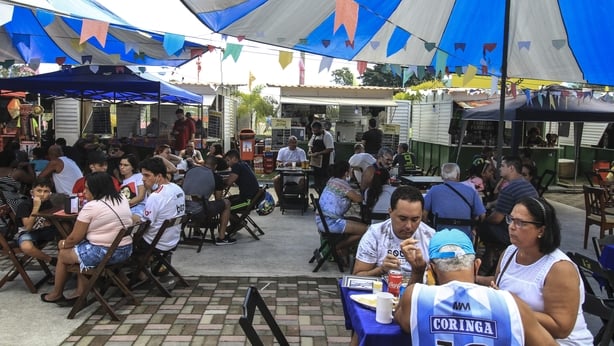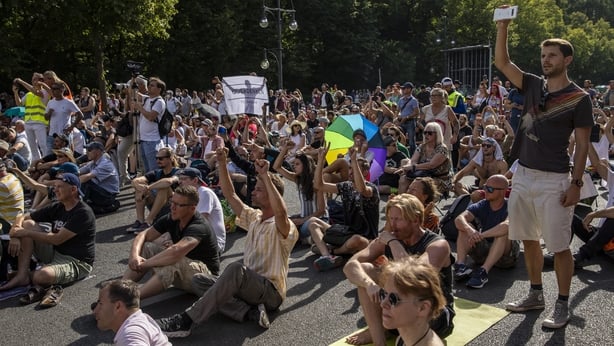The World Health Organization has warned there might never be a "silver bullet" for Covid-19 in the form of a perfect vaccine and that the road to normality would be long.
The WHO said this would mean some countries will require a reset of strategy.
More than 18.14 million people around the world are reported to have been infected with the disease and 688,080 have died, according to a Reuters tally.
Some countries that thought they were over the worst are experiencing a resurgence.
WHO Director-General Tedros Adhanom Ghebreyesus and WHO emergencies head Mike Ryan exhorted nations to rigorously enforce health measures such as mask-wearing, social distancing, hand-washing and testing.
"The message to people and governments is clear: 'Do it all'," Mr Tedros told a virtual news briefing from the UN headquarters in Geneva.
He said face masks should become a symbol of solidarity round the world.
"A number of vaccines are now in phase three clinical trials and we all hope to have a number of effective vaccines that can help prevent people from infection. However, there's no silver bullet at the moment - and there might never be."
The WHO head said that, while the coronavirus was the biggest health emergency since the early 20th century, the international scramble for a vaccine was also "unprecedented".
But Mr Tedros underscored uncertainties. "There are concerns that we may not have a vaccine that may work, or its protection could be for just a few months, not more.
"But until we finish the clinical trials, we will not know."
Mr Ryan said countries with high transmission rates, including Brazil and India, needed to brace for a big battle: "The way out is long and requires a sustained commitment," he said, calling for a "reset" of approach in some places.
"Some countries are really going to have to take a step back now and really take a look at how they are addressing the pandemic within their national borders," he added.
The WHO officials said an advance investigation team had concluded its China mission and laid out the groundwork for further efforts to identify the origins of the virus.
Sweeping new restrictions in Melbourne
Australia's Victoria state imposed fresh, sweeping restrictions yesterday, including a curfew in Melbourne for the next six weeks, a ban on wedding gatherings, and an order that schools and universities go back online in the coming days.
"Anything short of this will see it drag on for months and months and months," Victoria premier Daniel Andrews said of the outbreak.
Despite a lockdown, Melbourne has continued to report hundreds of new cases daily even as other states in Australia have reported zero or a small number.
Many other parts of the world are struggling with much bigger outbreaks.
Health authorities in South Africa, where a surge in cases had been expected after the gradual loosening of a strict lockdown, reported that infections exceeded the half-million mark.
The nation is by far the hardest-hit in Africa, accounting for more than half of diagnosed infections, although President Cyril Ramaphosa said the fatality rate is lower than the global average.
Latin America and the Caribbean passed another milestone yesterday as fatalities in the region climbed to more than 200,000, with Brazil and Mexico accounting for nearly three-quarters.

Iran - battling the Middle East's deadliest outbreak - reported its highest single-day infection count in nearly a month, warning that most of its provinces have been hit by a resurgence of the disease.
With infections and deaths soaring, the UN health agency has said the coronavirus pandemic is likely to be protracted and warned of possible "response fatigue".
"The WHO continues to assess the global risk level of Covid-19 to be very high," the agency said, adding that the effects of the pandemic "will be felt for decades to come".
Mexico overtook Britain to become the third hardest-hit country in virus deaths - after Brazil and the United States - with more than 46,600 fatal cases.
The US has now tallied more than 4.6 million cases and 154,793 deaths.
The pandemic has spurred a race for a vaccine with several Chinese companies at the forefront, while Russia has set a target date of September to roll out its own vaccine.
However, US infectious disease expert Anthony Fauci said it was unlikely America would use any vaccine developed in either nation.
As part of its "Operation Warp Speed", the US government will pay pharmaceutical giants Sanofi and GSK up to $2.1 billion for the development of a Covid-19 vaccine, the two companies have said.
In Europe, where many countries had hoped their outbreaks had been brought under control, Norway recorded its first virus death in two weeks and Switzerland reported its case numbers had crept up again.
Despite the resurgence, Europe has seen demonstrations against coronavirus curbs.
Thousands protested in Berlin in Germany over the weekend urging "a day of freedom" from the restrictions, with some demonstrators dubbing the pandemic "the biggest conspiracy theory".

The protests, in which many demonstrators failed to wear masks or respect social distancing rules, triggered calls for tougher penalties against those who violate curbs.
At least 45 police officers were injured and more than 130 people were arrested.

